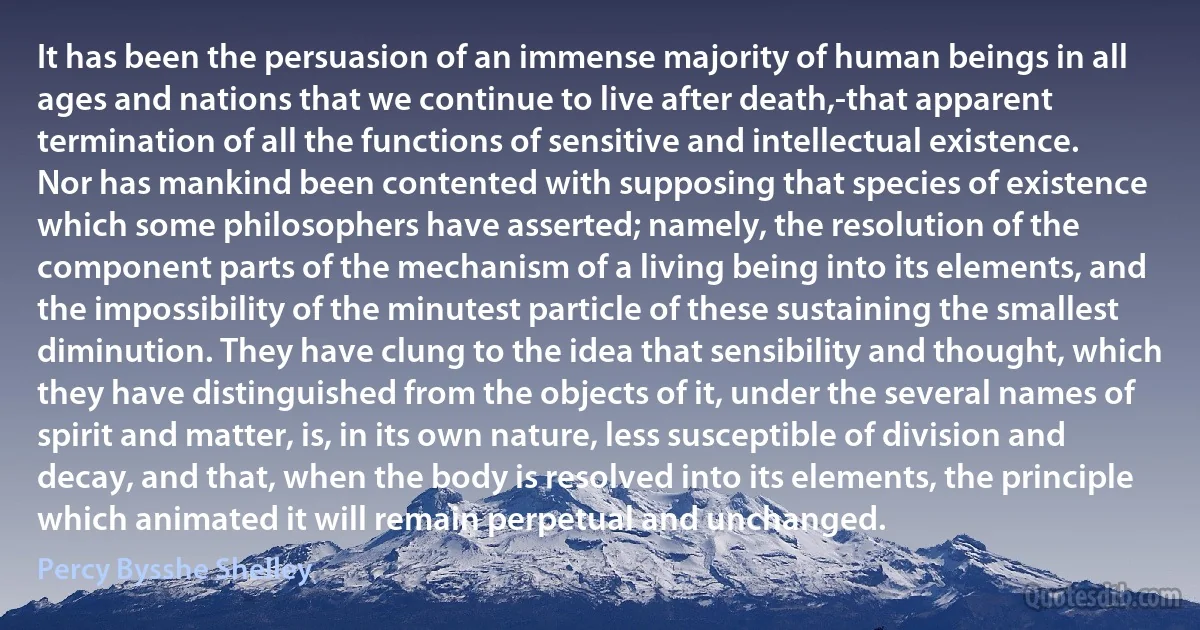
It has been the persuasion of an immense majority of human beings in all ages and nations that we continue to live after death,-that apparent termination of all the functions of sensitive and intellectual existence. Nor has mankind been contented with supposing that species of existence which some philosophers have asserted; namely, the resolution of the component parts of the mechanism of a living being into its elements, and the impossibility of the minutest particle of these sustaining the smallest diminution. They have clung to the idea that sensibility and thought, which they have distinguished from the objects of it, under the several names of spirit and matter, is, in its own nature, less susceptible of division and decay, and that, when the body is resolved into its elements, the principle which animated it will remain perpetual and unchanged.
Percy Bysshe ShelleyRelated topics
body component continue death diminution human idea intellectual less living live matter mechanism nature nor persuasion remain sensibility sensitive spirit susceptible sustaining termination thought under names partsRelated quotes
If we observe the aging of individuals, in the period after middle life, it seems to me that we can distinguish three ideal-typical outcomes. Some individuals bear within themselves some psychological sources of self-renewal; aging brings for them accretions of wisdom, with no loss of spontaneity and ability to enjoy life, and they are relatively independent of the culture's strictures and penalties imposed on the aged. Other individuals, possibly the majority, bear within them no such resources but are the beneficiaries of a cultural preservative (derived from work, power, position, etc.) which sustains them although only so long as the cultural conditions remain stable and protective. A third group, protected neither from within nor from without, simply decay. In terms more fully delineated elsewhere, we may have autonomous, adjusted, and anomic reactions to aging.

David Riesman
A distinguished agnostic once observed that in these days Christianity was not refuted, it was explained. Doubtless the difference between the two operations was, in his view, a matter rather of form than of substance. That which was once explained needed, he thought, no further refutation. And certainly we are all made happy when a belief, which seems to us obviously absurd, is shown nevertheless to be natural in those who hold it. But we must be careful. True beliefs are effects no less than false. In this respect magic and mathematics are on a level. Both demand scientific explanation ; both are susceptible of it. Manifestly, then, we cannot admit that explanation may be treated as a kind of refutation. /.../ This way lies universal scepticism. Thus would all intellectual values be utterly destroyed.

Arthur Balfour
To conclude, if we call light, those rays which illuminate objects, and radiant heat, those which heat bodies, it may be inquired whether light be essentially different from radiant heat? In answer to which I would suggest that we are not allowed, by the rules of philosophizing, to admit two different causes to explain certain effects, if they may be accounted for by one. ...If this be a true account of the solar heat, for the support of which I appeal to my experiments, it remains only for us to admit that such of the rays of the sun as have the refrangibility of those which are contained in the prismatic spectrum, by the construction of the organs of sight, are admitted under the appearance of light and colors, and that the rest, being stopped in the coats and humors of the eye, act on them, as they are known to do on all the other parts of our body, by occasioning a sensation of heat.

William Herschel
For what advantage is it, that the world enjoys profound peace, if thou art at war with thyself? This then is the peace we should keep. If we have it, nothing from without will be able to harm us. And to this end the public peace contributes no little: whence it is said, ‘That we may lead a quiet and peaceable life.' But if any one is disturbed when there is quiet, he is a miserable creature. Seest thou that He speaks of this peace which I call the third (inner, ed.) kind? Therefore when he has said, ‘that we may lead a quiet and peaceable life,' he does not stop there, but adds ‘in all godliness and honesty.' But we cannot live in godliness and honesty, unless that peace be established. For when curious reasonings disturb our faith, what peace is there? or when spirits of uncleanness, what peace is there?

John Chrysostom
Upon completion of the centennial of your birth – and this time only – we have come to address some remarks at your graveside. We report to you, Rosh Betar, that Jerusalem, the city that has become bound together, the eternal capital of Israel and of the Land of Israel, shall not be subjected to any division and is our liberated and indivisible capital and so it shall remain from generation to generation.
The western part of the Land of Israel is entirely under our control and it shall not be partitioned anymore. No part of this land shall be given over to a foreign administration, to foreign sovereignty.
We believe that a day will come when the two parts of the Land of Israel shall establish, peacefully, in agreement and understanding a covenant of alliance, a free confederation, for the purpose of join cooperation.

Menachem Begin
